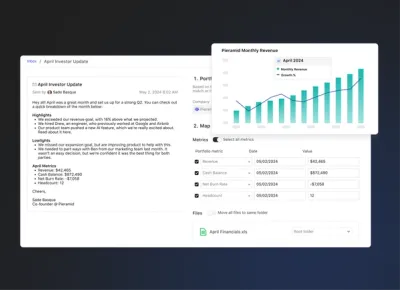
Investors are more than a source of capital. They have experience, advice, and networks you can leverage. It’s normal to feel intimidated by the people who just handed over a check, but it is vital for both parties that you tap into their knowledge to build a strong business.
As soon as you take on capital, you are expected to work toward generating returns for your investors. On the flip side, an engaged investor can add value to your business in order to help generate those returns. That said, you are likely not their only investment, so you need to show them you value their time by only asking important, specific questions.
When asked about the most important section of his investor updates, R.J. Talyor, Founder & CEO of Pattern89, said “In the Visible Update template I use, there’s a specific section named ‘Where I need help,’ where I list the 2-3 places that Quantifi needs new thought/idea/feedback on what we might do next. I always get responses from this section—introductions to potential customers, books/resources I should consider, or a quick phone call to talk through the area I’ve outlined.”
So what’s appropriate to ask your investors? And how do you do it? You’ll find most asks go back to their experience and network.
How to Ask Investors to Help With Closing Deals
At its core, building a VC-backed business is about generating revenue. The biggest value add for a business? Closing more deals. Your investors are in the “deal-making” business and likely have a knack for closing deals.
Use your investors professional networks to make an intro, set a meeting, or bring in the necessary backup to close a large deal. If you see your investor has a specific connection you’re looking for, don’t beat around the bush. Ask the investor for the exact intro you’re looking for and tell them how they can be of most value.
Don’t make the mistake of asking for help on a deal once it’s too late. As Paul Arnold from Switch Ventures, puts it, “A surprising number of founders only want to update investors once they’ve closed deals. They worry that they’ll look bad or weak or behind if they share leads that don’t convert. This is a bad approach. Your investors have the experience to know that not all leads will end in a deal”.
How to Ask Investors to Help With Hiring
Attracting talent is one of—if not the—most important resources businesses compete for on a daily basis. Using your investor network is a great place to start when searching for a new role. While they are often best suited to help fill senior positions, be sure to ask your investors for help when recruiting for any open position. Be sure to specific as possible about the role, as well as items like the experience level required, and target compensation,to make it low-maintenance for your investors. If you have a larger firm backing you, theres a chance they have an internal talent pool from which to pull qualified candidates.
How to Ask Investors to Help with Fundraising
Investors know other investors. Even if your investors are not interested in committing follow-on capital, they may be able to introduce you to other investors they know. Just as you should with making hiring and deal ask be sure to be as specific as possible, even giving your investors the name of the firm and partner you’d like to meet when possible. If you’re struggling to find specific investors, it is okay to ask if they know anyone in their network that might be a good fit.
Whether asking for help to close deals, hire, or fundraise, your best bet when going to investors for help is to communicate clearly and often. Speaking up only when you need help isn’t likely to get you the results you’re looking for. Remember to reverse the relationship, too—help promote an event, send deal flow, and help other companies in your investors’ portfolios. Lastly, don’t forget to publicly thank your investors when they go above and beyond.
Leveraging your investors is low-hanging fruit for moving the needle. Don’t leave your investors in the dark; send regular updates so you can make the most of your partnership.




